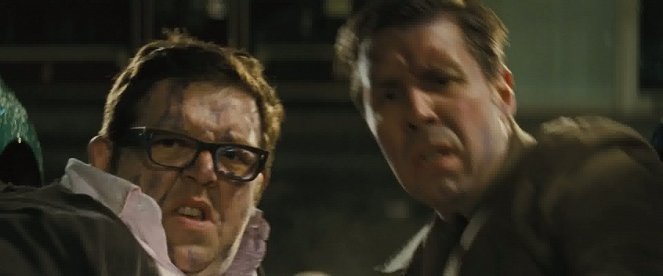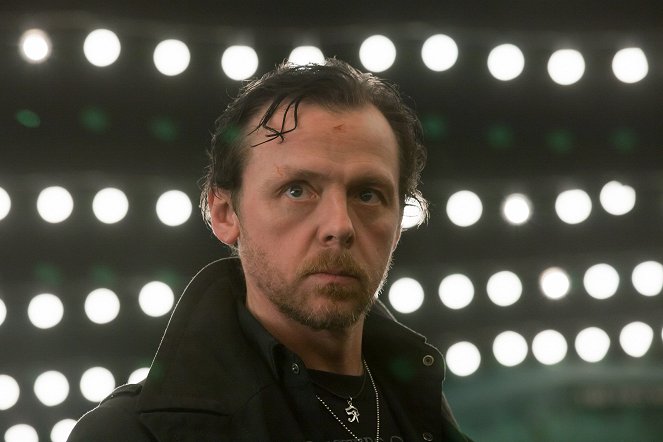Directed by:
Edgar WrightCinematography:
Bill PopeComposer:
Steven PriceCast:
Simon Pegg, Nick Frost, Martin Freeman, Rosamund Pike, Eddie Marsan, Paddy Considine, Pierce Brosnan, David Bradley, Bill Nighy, Mark Heap, Rafe Spall (more)VOD (4)
Plots(1)
Twenty years after their first epic pub crawl attempt, the "five musketeers" reunite to complete the ultimate challenge - one night, five friends, twelve bars - a boozy quest on which only the strongest will survive. They soon realise that reaching their final pub, The World's End, may be the least of their troubles. They're having the time of their lives, ready to take on the world but tonight they may have to save it. (Universal Pictures UK)
(more)Videos (22)
Reviews (11)
If you are not already put off by its length, don’t read this review if you have not seen The World’s End yet. It is probably the most mature film that this bunch of eternal nerds is able to make. Just like in the previous parts of the trilogy, to which it is connected by the “jumping over a fence” gag and the green Cornetto wrapper in the epilogue, this time the development of the relationship between Pegg and Frost adds dynamics to the narrative. However, their long-standing friendship is thematised by the film and The World’s End can be seen as a tour of film genres whose story axis can be either the strengthening or disintegration of a friendship. After the prologue in the style of high-school comedies, we find ourselves in the realm of a bitter recapitulation comedy that, at the moment when it could start to come across as clichéd and sentimental, turns into an action/sci-fi horror flick with robots full of blue gunk. The epilogue then throws in a post-apocalyptic adventure and perhaps even some vampirism (or am I the only who thought Pegg looked like Vampire Hunter D?). Each of the newly introduced genres does not displace the one that came before, but in some way enhances it so that, for example, the debts paid by the protagonists are always higher (in the end, it’s much more than just 600 pounds). Stacking up motifs inherent to numerous types of films logically results in an intentionally overwrought climax whose anti-climactic point parodies the epic endings of serious sci-fi films. ___ The filmmakers’ ambitions to go to greater depths are most apparent in the greater sophistication of the characters. Gary is mentally stuck in the past, which he refuses to leave behind. He again embarks on a partially completed endeavour, using the same seductive tricks and driving the same car. However, his outlandish behaviour draws attention away from his dependence on his friends (borrowed money, the car registered in Peter’s name), whom he accuses of being envious, though it is clear that there are a lot of reasons for him to envy them instead and that the others actually serve mainly as a means for him to egotistically bolster his own feeling of importance (he dominates the shots with his friends like a real “king”). ___ The placement of the altogether authentic heroes in the context of a mythical narrative, which is explicitly pointed out to us only in the epilogue, attest to Wright’s fondness for surprising viewers by creating unexpected contrasts, though the names of the protagonist (King) and his car (Beast) and references to the Bible and The Three Musketeers can also be considered indicative of this. The friends’ get-together is thus shot from the beginning in a boisterous style that accentuates even the entirely unimportant moments as if they were the climax of an action blockbuster: “action” close-ups of objects, super-fast cuts in the dialogue, spectacular transitions between shots, inspiration taken from the aesthetics of comic books (the scene that looks like a strip of images) and video games (fight scenes viewed from a third-person perspective). Like Gary, who only slowed downs for stop lights, Wright refuses to stop, forcing the protagonists to resolve unsettled disputes from the past while massacring hordes of robotic aliens. Because the characters are traumatised by, for example, bullying or a very unpleasant traffic accident, another kind of tension that prevents the film from stagnating arises between its amusing form and its content suitable for a psychological chamber play. ___ Thanks to the ceaseless intertwining of the serious and the playful, Wright can, for example, fearlessly use the well-known “who’s infected” scene from Carpenter's The Thing as a model for the confidence game. The question of who is actually human and what form authentic humanity has in the current era, choked with demands for uniform perfection, permeates the film, so this does not involve a gratuitous allusion that would be exhausted by revealing it (the broken back à la Bane, for example, fits into this category). Regardless of the numerous other quoted films about the robotisation of the globalised world (e.g. Village of the Damned) and humanity’s extraordinary talent for self-destruction (e.g. Soylent Green), Wright manages to combine outside sources in an original and entertaining way, so the result doesn’t disintegrate into isolated scenes. ___ The carefully thought-out structure of the film, which at first may seem to be an unorganised multi-genre mess, becomes apparent upon repeated viewings. The group arrives at the first pub and the first indication that places are also losing their form comes after a twenty-minute exposition, during which we get to know all of the protagonists in rough outlines. The first twist – the initial fight with robots – comes after not quite forty minutes. A new goal is established at the 45-minute mark (or rather the original goal, which everyone except Gary wanted to abandon, is restored). An hour into the film, we learn some important information about the way the people are being “lobotomised”. The goal (the last pub) is achieved twenty minutes before the end, when all of the storylines converge and the time comes for the denouement, the protagonists’ confrontation with themselves. A bonus for attentive viewers is the director’s obsession with numbers, which are hidden throughout the film in accordance with the number of pubs that the protagonists visit in succession. In the third pub, Gary drinks three beers; in the seventh, Steve points out that he has already drunk seven pints; after they leave the eighth pub, we find out that Adrian died eight years prior in Italy; at the ninth, there is a sign with the numeral 9, and so on. On the second viewing, you may notice that roughly two-thirds of the events repeat (again, the motif of recycling) what Gary and his friends had previously experienced in high school (in both cases, first Oliver falls away, then Sam, then Peter). ___ The frenetic pace of the narrative makes The World’s End a film that is impossible to fully appreciate with just one viewing and which every (im)mature nerd will gladly watch again and again. Well, maybe not every nerd, but definitely me. 90%
()
(less)
(more)
The first third is like a flowery hop, boyish-bodied ALE with a delicious taste, whereas the second third begins to smell like an ordinary Eurolager, but it's brisk and drinkable. The final third is like a musty small cellar beer with the dull aftertaste of steamy socks of people who saw too much in their idea. A film whose wheels fall off. Wasting talent and good ingredients for something that again does not lose sight of the genre, but desperately loses sight of itself. History repeats itself, but compared to Hot Fuzz, this is an even thinner attempt at a cheeky meta-party. Most of all, it's quite sad to see how all the overlap literally stamps out the film at the end of the verbatim and still stays with only a few badly grafted references. This is simply not cheeky or clever, just weathered. I pour the end out the window. [65%].
()
It’s good, but my expectations were higher. Hot Fuzz set the bar very high, blending with more grace the serious plot of a thriller with parody. The World's End tries to blend this style of humour with a horror sci-fi thriller, but it grinds a bit (though not as much as, in my opinion, Shaun of the Dead), sometimes the humour is too much, sometimes not enough. What I’m most sorry about is the weird and unnecessary end-credits scene, it ruins the positive impression of the bold and surprising twist with which the film had won me over.
()
I'm wavering between three and four stars, and that's ultimately one of the biggest surprises that The World's End brought me. The other ones are that Simon Pegg is similar to Tomas Hajíček from the band Krucipüsk, that Nick Frost plays a truly completely different character than you would expect, at least at the beginning, and that Edgar Wright seems to have abandoned his typical bullet shots, or at least is trying to limit them, because there are noticeably less of them. I can't say that I was completely disappointed, but the fact is that I liked The World's End a lot less than the previous two films. I thought it was too long and unnecessarily action-packed (the first encounter with the UFOs was great, but the others just repeated it - and not in the funny "déjà vu" sense). Kudos to the music (the irresistible “Whiskey Bar" scene by The Doors) and all the actors, and I really liked the epilogue. I was thinking that is was too bad that the first half of the film didn't take place "before" and the second half "after". I round down the three and a half stars for now with a heavy heart and will wait to watch it on DVD.__P.S. I don't know how much the other viewers enjoyed the film, I was alone in the movie theatre.
()
Wright, Pegg and Frost are back and in excellent form, this time in a beer-drinkers’ sci-fi about the threat of technology taking over. Almost non-stop situation gags, the action looks like a typical bar fight, crossed with kung-fu. The special effects are excellent, the story gets you thinking. Welcome to the end of the world!
()


